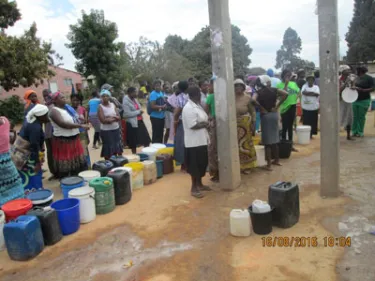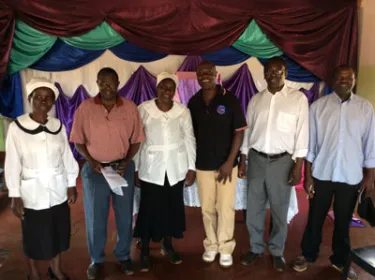The Ministry of Boreholes
A letter from Doug Tilton serving as regional liaison for Southern Africa, based in South Africa
Dear Friends,
"Every day we are able to give water to about 300 to 500 people who are not members of our congregation,” writes the Rev. Talkmore Chilanga, pastor of the Uniting Presbyterian Church in Southern Africa (UPCSA) Mabvuku congregation. “Each person gets 40 litres of water from the borehole.”
In 2014 members of the “Zimbabwe KidZ” mission partnership, borne of congregations in the Presbytery of Denver, worked with Presbytery of Zimbabwe officials to develop a list of a dozen locations that were prioritized for water development and began to raise funds for the drilling of wells (known in Zimbabwe as “boreholes”). To date seven boreholes have been completed. One of the most recent is at Mabvuku on the outskirts of Zimbabwe’s capital, Harare. The borehole’s solar-powered pump fills two 5,000-litre storage tanks.
The Presbytery of Denver has been in partnership with the Presbytery of Zimbabwe, part of the UPCSA, since 2005. A cluster of the presbytery’s churches—Green Mountain, St. James, and the fellowship of Divino Salvador— formed “Zimbabwe KidZ” to advance the educational opportunities for children in Zimbabwe, particularly through the 10 schools operated by the UPCSA.
Initially the Denver churches envisioned collecting and sending schoolbooks and supplies, but as they talked with their partners in Zimbabwe and visited the UPCSA schools, it became clear that the schools’ greatest need was for safe, reliable water supplies. Climate change, drought and failing infrastructure mean that many communities receive municipal water infrequently and irregularly. Because state regulations require that educational facilities have reliable water supplies before they can be registered, this is a hurdle for UPCSA’s goal of creating preschool programs in a number of congregations to promote early childhood development.

The Mabvuku congregation plans to host a preschool but, according to Rev. Chilanga, the need for water in the area has reached an alarming stage. “By 5 a.m. hundreds of people start queuing for water,” he said. In order to avoid draining the tank completely and putting too much strain on the pump, they can supply water to the tank for only a few hours each day. As a result hundreds of people each day go home disappointed. The disabled and the elderly are the most affected by this critical shortage of water in Mabvuku.
“We pray that we can upgrade the water system in order to increase the supply of water in the area and the opportunity God has given us to minister,” he said. “As a church we believe that we do not live for ourselves but we live for the community in which God has planted us as his light. We give thanks to the Denver mission partnership and Zimbabwe KidZ for supporting us in prayers and financially, which enabled us to minister in our community in such a special way.”

The PC(USA) also partners in Zimbabwe with the Harare Synod of the Church of Central Africa Presbyterian (CCAP), another transnational denomination that has three further synods in Malawi and one in Zambia. The CCAP, too, has been working to develop safe, reliable water sources in the communities that they serve. Looking through the list of potential borehole sites that the Presbytery of Zimbabwe had developed in consultation with the Presbytery of Denver, I noticed one location, Kadoma, which was also on the CCAP’s list of priority sites. On further investigation I discovered that the UPCSA Eiffel Flats congregation is literally next door to the CCAP Rio Tinto congregation. Through addition inquiries I found that both churches were open to the prospect of working together to plan, develop and manage the well for the benefit of their members and the surrounding community. In fact, the two congregations had a long history of cooperation and cordial relations, so it seemed a logical expression of their joint witness and mutual ministry.
On a visit to Zimbabwe at the end of 2015 I made a point of traveling to Kadoma with officials of both the UPCSA and the CCAP to encourage the two congregations in working together. At a meeting of representatives of both churches I was pleased to find that they were eager to undertake the initiative jointly and had already held discussions about how they would manage it. They had elected a water committee composed of three members from each congregation, and they shared with me their plans for how they would select a drilling site and maintain the water system.
In October this year, during a visit of a delegation from Denver, the two congregations dedicated the new well. It has been so rewarding to see the close collaboration between these two churches as they live out their commitment to God and their neighbors by demonstrating good stewardship of resources through this common ministry. We hope that there will be growing opportunities for collaboration and joint witness by the UPCSA and the CCAP. And we in the PC(USA) look forward to continuing to walk alongside our sisters and brothers in the UPCSA and the CCAP as we discern together the ways in which God is calling us to realize a shared vision of life abundant for all of God’s family!
Thank you for the many ways in which you participate in God’s mission through your prayers and messages of encouragement, through your involvement in mission outreach in your own communities and across the U.S.A., and in your support for the work of Presbyterian World Mission, PC(USA) mission co-workers like me, and our global partners.
Grace and peace,
Doug
Individuals and congregations interested in supporting the UPCSA and their work to bring clean water and educational opportunities may send a check to: Presbyterian World Mission, PO Box 643700, Pittsburgh, PA 15264-3700. Checks should be made to Presbyterian Church (U.S.A.) and noted for the Presbytery of Zimbabwe General Support E052041 (please mention “Water Development” on the memo line) or a fund for water and sanitation for all, E862703.
